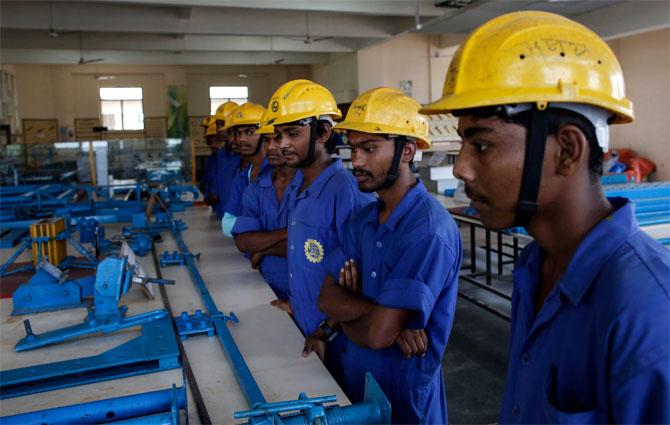Minimum Wages Act: Categorisation of Employee Skills on Basis of Experience is Ultra Vires: SC

Representational image. | Image Courtesy: Rediff.com
The Supreme Court has held that the categorisation of unskilled employees as semi-skilled and semi-skilled as skilled on the basis of their experience in the notification issued for fixing/revising the minimum rates of wages is beyond the jurisdiction of the government.
In the notification issued under Section 5 of the Minimum Wages Act, the labour department of Haryana provides for following categorisation: unskilled employees having five years experience would be deemed categorised as semi-skilled "A"; that after three years of experience in semi-skilled "A", the employees would be deemed categorised as semi-skilled "B"; that after three years of experience in skilled "A", the employees would be deemed categorised as skilled "B".
In Hindustan Sanitaryware and Industries Ltd. vs. State of Haryana, the Supreme Court was considering an appeal against Punjab and Haryana High Court order which had upheld the notification issued under Minimum Wages Act. The bench comprising Justice L. Nageswara Rao and Justice MR Shah observed:
"Such categorization or classification by deeming workmen in one category to belong to another category is in direct contravention of the contract between the employer and the employee and is beyond the jurisdiction of the Government."
Only Trainees Appointed for Reward Can Be Included in Notification
The bench also observed that not all trainees could be included in the notification. Though it upheld minimum wages fixed for trainees who are appointed for reward, the bench observed that the trainees who are not paid wages cannot be included in the notification. It also held that no power vested in the Government under the Act to decide the period of training and any stipulation with regard to the training period is ultra vires.
The court held that 'employee' would bring the workmen employed through the contractors within the purview of the Act.
Prohibition of Segregation of Wages into Components Impermissible
The bench also held that the prohibition of segregation of wages into components in the form of allowances in the Notification is impermissible. It said:
"Wages" is defined in Section 2(h) to mean all remuneration, capable of being expressed in terms of money, which would, if the terms of the contract of the employment, express or implied were fulfilled, be payable to a person in respect of his employment or of work done in such employment and includes house rent allowance. There are four exclusions in the definition relating to travelling allowance, value of housing accommodation, supply of light, water, medical attendance, etc. If certain components of the remuneration are taken care of by the employer, he cannot be asked to pay twice over such allowance/ payments which are part of the remuneration."
Allowing the appeals, the bench summarised:
- The prohibition of segregation of wages into components in the form of allowances in the Notification is impermissible;
- The security inspector/ security officer/ security supervisor cannot be included in the Notification;
- Trainees who are employed without payment of any reward cannot be covered by the Notification.
- Categorisation of unskilled employees as semi-skilled and semi-skilled as skilled on the basis of their experience is ultra vires.
- Fixing the training period for one year is beyond the jurisdiction of the Government.
Get the latest reports & analysis with people's perspective on Protests, movements & deep analytical videos, discussions of the current affairs in your Telegram app. Subscribe to NewsClick's Telegram channel & get Real-Time updates on stories, as they get published on our website.
























